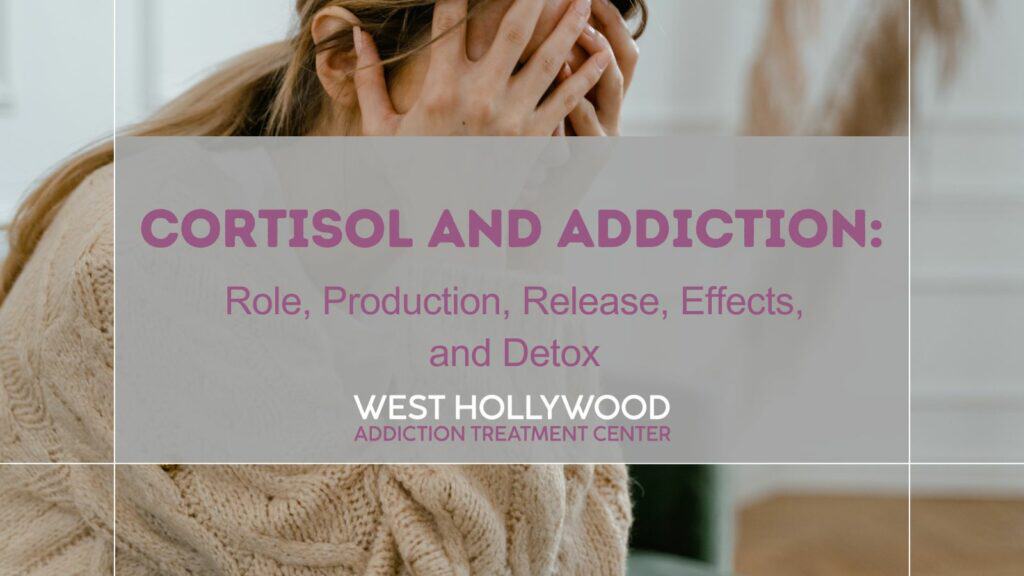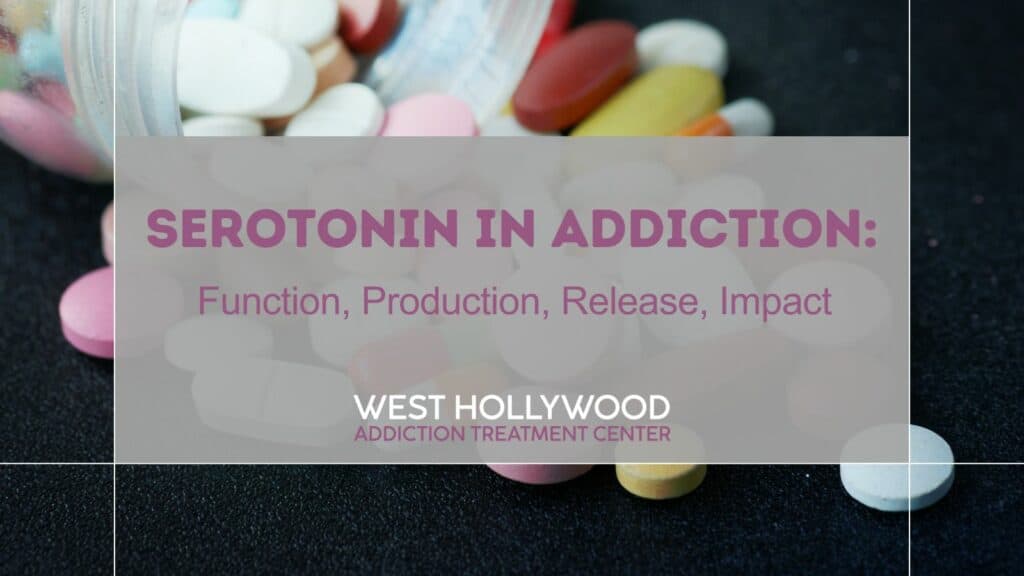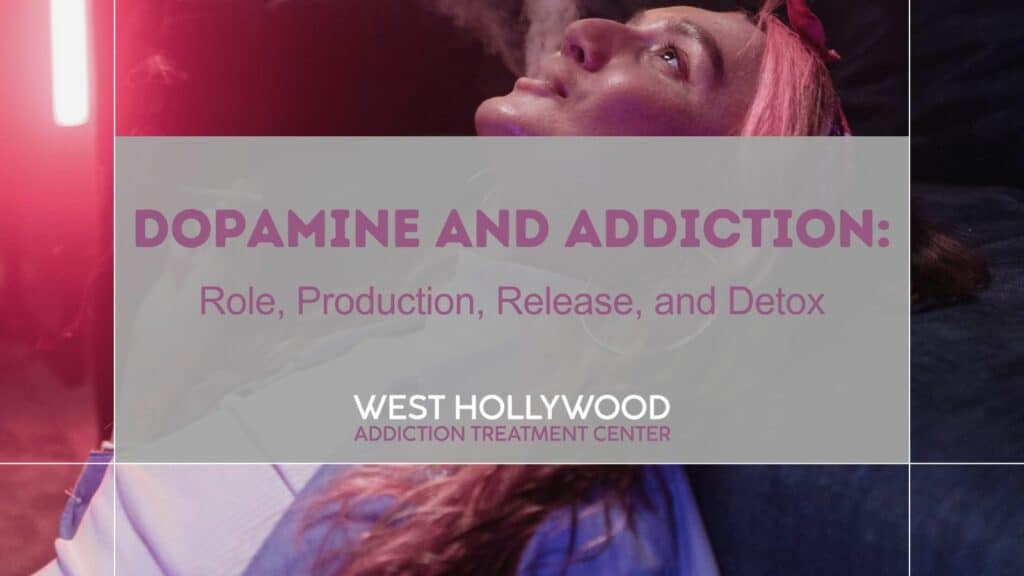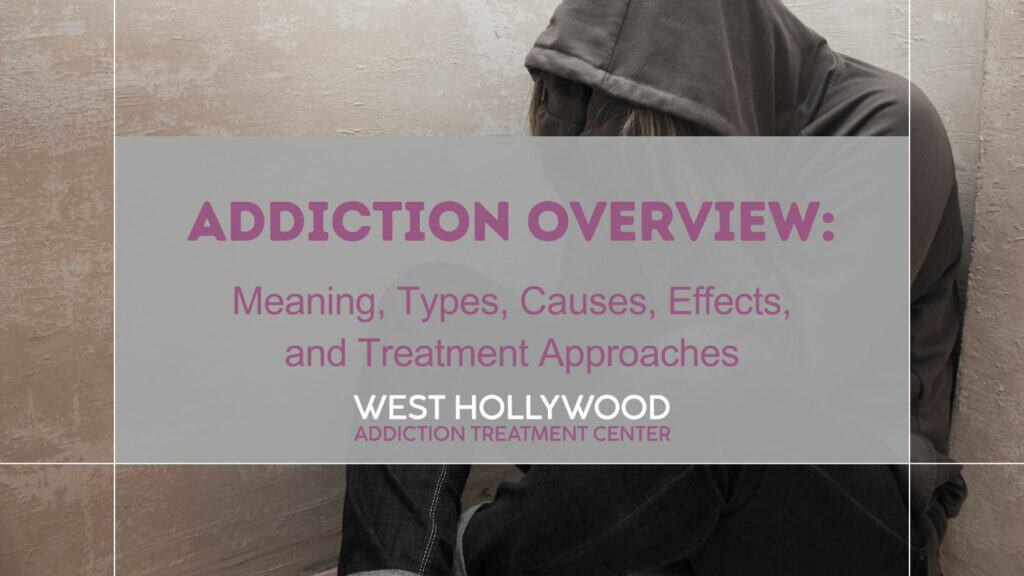Cortisol is a hormone secreted by the adrenal glands to respond to stress-causing stimuli.
Cortisol is synthesized and released in reaction to physical and psychological stressors. Its production is regulated by the HPA axis, which includes the hypothalamus, pituitary gland, and adrenal glands.
The HPA axis is sensitive to inputs from the limbic system and the prefrontal cortex, which are affected during times of stress.
Cortisol affects addiction by triggering stress-like reflexes upon acute substance intake, potentially increasing drug self-administration and long-term use disrupting normal HPA axis functioning, and contributing to addiction vulnerability and relapse risk.
During detoxification, cortisol levels fluctuate, especially following periods of heavy substance use. For instance, alcohol withdrawal often leads to elevated cortisol levels, which contribute to withdrawal symptoms and relapse risk. Cortisol administration alleviates craving in heroin-dependent individuals, particularly those with lower heroin consumption levels.
What Is Cortisol?
Cortisol is a steroid hormone produced by the adrenal glands in response to stress. In addiction, cortisol influences the brain’s reward system by triggering stress-like responses upon substance intake, potentially increasing drug self-administration.
Referred to as the “stress hormone,” Cortisol is intricately linked to addiction and the body’s response to stress.
Cortisol is involved in addiction through its interactions with the brain’s motivational systems and the hypothalamic-pituitary-adrenocortical (HPA) axis.
Extended substance use interrupts normal cortisol regulation, contributing to addiction vulnerability and relapse risk. Additionally, cortisol administration alleviates cravings in certain individuals with substance dependence.
Substance use disorder refers to the repetitive consumption of alcohol and/or drugs, such as tobacco, cannabis, stimulants, hallucinogens, and opioids, resulting in notable clinical and functional decline.
This includes difficulties in controlling usage, impairments in social functioning, and engaging in risky behaviors. The severity of the disorder, whether mild, moderate, or severe, is determined by the extent to which an individual meets specific diagnostic criteria, as outlined by the American Psychiatric Association in 2013.
Understanding the relationship between cortisol and addiction is crucial for comprehending how stress impacts substance abuse, as well as for developing effective strategies for addiction prevention and treatment.
What Is the Relationship Between Cortisol and Addiction?
The relationship between cortisol and addiction is complex and bidirectional. Chronic stress and dysregulation of the HPA axis lead to alterations in cortisol levels, which contribute to the development and maintenance of addictive behaviors.
Conversely, substance abuse dysregulates the HPA axis and elevates cortisol levels, further exacerbating stress and perpetuating the cycle of addiction.
Marceau and Abel (2018) conducted research titled Mechanisms of cortisol – substance use development associations: Hypothesis generation through gene enrichment analysis.
They assert that the connection between cortisol function and substance use is intricate, occurring across various analytical levels and displaying bidirectional influences at different stages of substance use progression.
Moreover, they highlight the potential for genetic factors to influence cortisol-substance use associations, emphasizing the necessity for research designs that incorporate genetic considerations to explore the mechanisms underlying the relationship between cortisol function and substance use phenotypes from initiation to disorder.
The interplay between genes and the environment, as well as the developmental context, are likely to influence the effectiveness of prevention and intervention strategies aimed at mitigating substance use problems.
Stress and Substance Abuse
Stress is a common trigger for substance abuse and relapse among individuals with addiction. When faced with stressful situations, individuals turn to drugs or alcohol as a maladaptive coping mechanism to alleviate discomfort or escape negative emotions.
Long-term stress also impairs decision-making and impulse control, making it more challenging for individuals to resist the urge to use substances.
What Is the Role of Cortisol?
Cortisol is a hormone produced by the adrenal glands in response to stress. It serves a vital function in the body’s fight-or-flight response, helping to mobilize energy reserves and regulate various physiological processes.
Cortisol levels fluctuate throughout the day, peaking in the morning and declining in the evening, following a circadian rhythm.
Over time, substance use precludes normal cortisol regulation, leading to addiction vulnerability and relapse risk.
In addition, cortisol administration eases craving in certain individuals with substance dependence, highlighting its complex involvement in addiction processes.
How Is Cortisol Produced and Released?
The production and release of cortisol are regulated by the hypothalamic-pituitary-adrenal (HPA) axis, a complex neuroendocrine system.
When the brain perceives a stressor related to addiction such as hankerings or drug withdrawal, the hypothalamus releases corticotropin-releasing hormone (CRH), which signals the pituitary gland to release adrenocorticotropic hormone (ACTH).
ACTH then stimulates the adrenal glands to produce and release cortisol into the bloodstream, contributing to the stress response associated with addiction.
Chronic substance use dysregulates the HPA axis, leading to alterations in cortisol levels.
What Are the Effects of Substance Abuse on Cortisol Levels?
Cortisol exerts widespread effects on metabolism, immune function, and inflammation. In times of acute stress related to addiction, cortisol helps increase blood sugar levels, suppress the immune system, and enhance cardiovascular function to prepare the body for action.
However, protracted drug abuse leads to elevated and dysregulated cortisol levels and has detrimental effects on health, including increased risk of obesity, diabetes, cardiovascular disease, and mental health disorders commonly observed in individuals struggling with addiction.
Substance abuse, particularly chronic use of drugs or alcohol, disrupts the body’s stress response system and leads to dysregulation of cortisol levels.
Research has shown that certain substances, such as cocaine, opioids, and alcohol, directly impact cortisol production and release, altering the functioning of the HPA axis.
Prolonged substance abuse results in blunted cortisol responses to stress and contributes to a state of chronic stress and dysregulation.
What Is Detoxification and Cortisol Regulation?
Detoxification, or the process of removing toxins from the body, is an essential component of addiction treatment. During detox, individuals undergo withdrawal as their bodies adjust to the absence of drugs or alcohol. This withdrawal process be physically and psychologically taxing, causing increased stress and cortisol levels.
Therefore, detoxification programs often incorporate strategies to manage stress and support cortisol regulation, such as relaxation techniques, mindfulness practices, and pharmacological interventions.
Understanding the intricate relationship between cortisol and addiction sheds light on how stress impacts substance abuse and underscores the importance of developing effective strategies for addiction prevention and treatment. Cortisol, as the “stress hormone,” is vital to the body’s response to stress and is intricately linked to addiction.
Chronic stress and dysregulation of the hypothalamic-pituitary-adrenal (HPA) axis, which regulates cortisol production, is tagged to the development and maintenance of addictive behaviors. Inversely, substance abuse dysregulates the HPA axis and elevates cortisol levels, further exacerbating stress and perpetuating the cycle of addiction.
Research by Marceau and Abel (2018) emphasizes the complexity of this relationship and highlights the need for genetically informed designs to explore the mechanisms underlying cortisol-substance use associations. Additionally, stress is a typical trigger for substance abuse and relapse, underscoring the importance of stress management techniques in addiction treatment. Addressing cortisol dysregulation and stress reactivity, the detoxification programs support individuals in achieving long-term recovery from addiction.
Are cortisol levels measured?
Yes, cortisol levels are measured through various methods, including blood tests, saliva tests, and urine tests. These tests provide valuable information about an individual’s stress response and overall health.
Are there natural ways to regulate cortisol levels?
Yes, there are several natural ways to regulate cortisol levels, including practicing stress-reduction techniques such as meditation, deep breathing exercises, yoga, and mindfulness. Additionally, getting regular exercise, maintaining a healthy diet, prioritizing sleep, and engaging in relaxing activities regulate cortisol levels.
Can Stress Reduction Techniques Help Modulate Serotonin and Cortisol Levels in Addiction?
Stress reduction techniques, such as mindfulness meditation, deep breathing exercises, and yoga, can help modulate serotonin and cortisol levels in addiction. By promoting relaxation and mitigating the physiological stress response, these practices may restore balance to the serotonin-cortisol axis, alleviate cravings, and support recovery from addiction.

Share This Post



